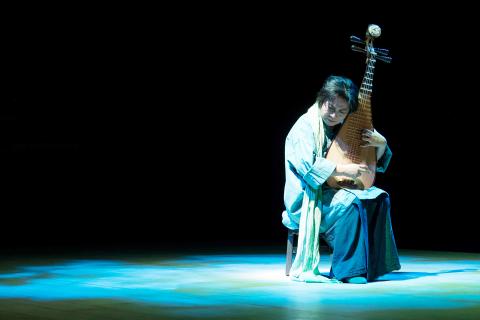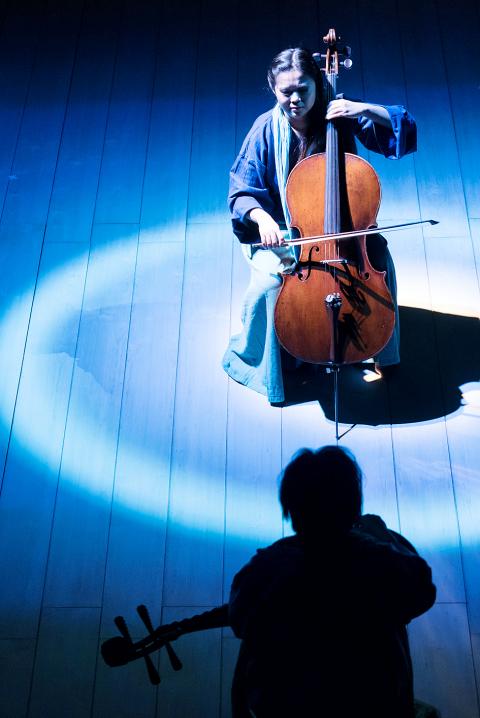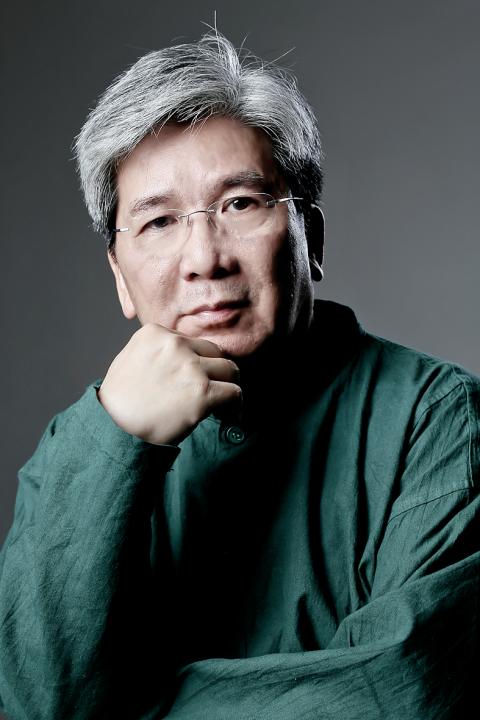With its appearance and structure resembling a symphony orchestra but using Chinese musical instruments, Chinese orchestra is a hybrid musical form. For pipa maestro Wong Chi-ching (王梓靜), however, the genre, which was developed in the early 20th century, has little to do with classical Chinese music.
Wong, who was the principal pipa player for the Hong Kong Chinese Orchestra for 26 years, says Chinese musical instruments have a strong, distinctive sound, while Western instruments are easily divided into groups that lend themselves to harmonies.
In 2003, she co-founded Wuji Ensemble (無極樂團) with Law Wing-fai (羅永暉), a renowned Hong Kong composer and educator, as an attempt to “break the pattern of the large modern Chinese orchestra.”

Photo courtesy of Wuji Ensemble
“Criticism of Chinese orchestra began in the 1980s and has never stopped, but no one has resolved the problem [because] schools and colleges have trained countless musicians following the system,” Wong says.
Law believes Chinese orchestra is intrinsically contradictory.
“The most difficult challenge for composers is to write compositions for Chinese orchestras. It is mainly because the musical instruments refuse to blend and match with each other. You end up getting acoustic conflicts by emulating the Western [symphony orchestra],” says Law, whose diverse oeuvre spans Chinese and Western orchestral pieces, operas and film scores.

Photo courtesy of Wuji Ensemble
INNOVATION
With Wuji, the duo place the focus on individual instruments. The ensemble avoids the large arrangement typical of an orchestra, allowing each instrument to express itself within one score.
The unique sound created by Wuji is based on two plucked-string instruments: the ruan (阮) and the pipa (琵琶). While the sound of the pipa is loud and passionate, the ruan can be described as gentle and modest. The complementary qualities of the instruments provide a foundation upon which different instruments can join and create distinctively rich sounds.

Photo courtesy of Wuji Ensemble
Wong describes the approach as “harmonious but different.” Western instruments can also be included.
Wong cites the cello and the erhu (二胡) as an example. “The two can converse even though they sound different. Then a sheng (笙) [a Chinese woodwind instrument] joins the dialogue, while the trio remain independent from one another,” she says.
SPIRITUAL CULTIVATION KEY
The musicians at Wuji say their work is also about learning to cultivate the mind and spirit. The schooling is holistic, with members following a routine that includes meditation, martial arts, dance and calligraphy — much broader than the academic training that emphasizes technique.
Wong says Chinese music should be appreciated on three different levels. The first, xing (形), relies on techniques to create images in the listener’s mind. Qing (情) uses melodies to express feelings, while the third and most advanced is atmosphere, yi (意), referring to an artist’s creative process, which demands that performers have a deep understanding of Chinese culture to be able to convey the essence of the music.
Wong, who has worked with Law for more than 30 years, says the composer’s music is not a matter of only technique.
“I practiced calligraphy eight hours a day for several years in order to perform Law’s A Thousand Sweeps (千章掃) [a pipa concerto inspired by the art of calligraphy],” the pipa soloist says.
EAST MEETS WEST
Wuji Ensemble will perform its latest work When Petals Fall in Serenity (落花無言) in Taipei next month as part of Hong Kong Week (香港週), an annual event aimed at facilitating a deeper understanding of Hong Kong’s arts and culture. Now in its fourth edition, it is slated to open on Sept. 10 and run through Oct. 11 at various venues throughout the capital.
The work is introduced as an atmospheric music theater (意境音樂劇場), which blends visual elements from Western theater with poetry, Chinese dance and music as well as Tibetan singing bowls and vocal music performed by renowned Hong Kong tenor David Quah (柯大衛) and others. Law says that the performance combines the Chinese idea of atmosphere, or yi, with principles derived from Western theater, and muses on the art and history of the Buddhist frescoes at Dunhuang (敦煌) in China’s Gansu Province.
Law says he used to be a practitioner of avant-garde music, but gradually found it to be just another manifestation of techniques which lacks soul.
“Eventually, I returned to my roots to express what I feel in my heart. When Petals Fall in Serenity is simple, accessible and the audience doesn’t need years of musical training to understand it. It is a direct exchange between the composer and the audience,” he says.
Wong and Law stress the importance of looking into one’s own culture for inspiration. And while China does have an ancient musical tradition, they say it is currently not a good place to look for inspiration.
“China is experiencing a time of great turbulence. They don’t know how to be calm and quiet. Everything is about making money and showing off,” Law says.
“Taiwan should look inward. I have high regard for Taiwanese culture. It has deep roots and is rich and unique. There is so much that you can develop, express and celebrate,” he adds.
Late next month, When Petals Fall in Serenity is scheduled to take place at National Taiwan University of Arts (NTUA) on Sept. 25 and Sept. 26. On Sept. 18, tenor Quah and stage designer and performer Tsang Man-tung (曾文通) will hold free vocal and Tibetan singing bowl masterclasses respectively at NTUA. More information can be obtained at the Chinese-English Web site of Hong Kong Week at www.hongkongweek-taiwan.hk.

On April 26, The Lancet published a letter from two doctors at Taichung-based China Medical University Hospital (CMUH) warning that “Taiwan’s Health Care System is on the Brink of Collapse.” The authors said that “Years of policy inaction and mismanagement of resources have led to the National Health Insurance system operating under unsustainable conditions.” The pushback was immediate. Errors in the paper were quickly identified and publicized, to discredit the authors (the hospital apologized). CNA reported that CMUH said the letter described Taiwan in 2021 as having 62 nurses per 10,000 people, when the correct number was 78 nurses per 10,000

As we live longer, our risk of cognitive impairment is increasing. How can we delay the onset of symptoms? Do we have to give up every indulgence or can small changes make a difference? We asked neurologists for tips on how to keep our brains healthy for life. TAKE CARE OF YOUR HEALTH “All of the sensible things that apply to bodily health apply to brain health,” says Suzanne O’Sullivan, a consultant in neurology at the National Hospital for Neurology and Neurosurgery in London, and the author of The Age of Diagnosis. “When you’re 20, you can get away with absolute

May 5 to May 11 What started out as friction between Taiwanese students at Taichung First High School and a Japanese head cook escalated dramatically over the first two weeks of May 1927. It began on April 30 when the cook’s wife knew that lotus starch used in that night’s dinner had rat feces in it, but failed to inform staff until the meal was already prepared. The students believed that her silence was intentional, and filed a complaint. The school’s Japanese administrators sided with the cook’s family, dismissing the students as troublemakers and clamping down on their freedoms — with

As Donald Trump’s executive order in March led to the shuttering of Voice of America (VOA) — the global broadcaster whose roots date back to the fight against Nazi propaganda — he quickly attracted support from figures not used to aligning themselves with any US administration. Trump had ordered the US Agency for Global Media, the federal agency that funds VOA and other groups promoting independent journalism overseas, to be “eliminated to the maximum extent consistent with applicable law.” The decision suddenly halted programming in 49 languages to more than 425 million people. In Moscow, Margarita Simonyan, the hardline editor-in-chief of the